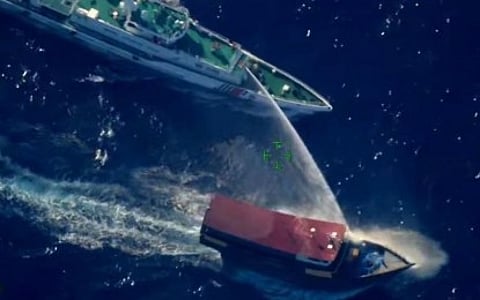
- NEWS
- the EDIT
- COMMENTARY
- BUSINESS
- LIFE
- SHOW
- ACTION
- GLOBAL GOALS
- SNAPS
- DYARYO TIRADA
- MORE

The Group of Seven (G7), an informal intergovernmental organization made up of the world’s largest developed economies, slammed China’s continuing “militarization, coercive and intimidation acts” in the South China Sea (SCS).
The G7 Foreign Ministers of Canada, France, Germany, Italy, Japan, the United Kingdom, and the United States issued a joint communiqué over the weekend, criticizing China’s type of resolve in its vast claims over the South China Sea, which overlaps the Philippine exclusive economic zone (EEZ) in the West Philippine Sea.
“We are seriously concerned about the situation in the East and South China Seas and reiterate our strong opposition to any unilateral attempts to change the status quo by force or coercion,” the communiqué read.
The G7 cited China’s “dangerous maneuvers” and use of water cannons against Philippine vessels carrying out “legitimate” routine resupply missions to the Ayungin Shoal in the WPS.
“We continue to oppose China’s dangerous use of coast guard and maritime militia in the South China Sea and its repeated obstruction of countries’ high seas freedom of navigation, and we express serious concern about the increasing use of dangerous maneuvers and water cannons against Philippine vessels in this regard,” it added.
The G7, representing the world’s leading industrialized democracies, underscored that Beijing has no legal basis for its expansive maritime claims in the South China Sea.
“We re-emphasize the universal and unified character of the United Nations Convention on the Law of the Sea and reaffirm UNCLOS’ important role in setting out the legal framework that governs all activities in the oceans and the seas,” it said.
The G7 reiterated that the ruling rendered by the Arbitral Tribunal on 12 July 2016 serves as a “significant milestone — which is legally binding upon the parties to those proceedings and a useful basis for peacefully resolving disputes between the parties.”
Through the landmark award, the Arbitral Tribunal ruled that China’s nine-dash line exceeded the geographic and substantive limits of its maritime entitlements provided for under UNCLOS.
The invisible demarcation outlines China’s overlapping claims that encroach on large parts of the Philippines’ 200-nautical mile EEZ and continental shelf and other strategic bodies of water bordering Brunei, Malaysia, Indonesia, Singapore, Thailand and Vietnam.
